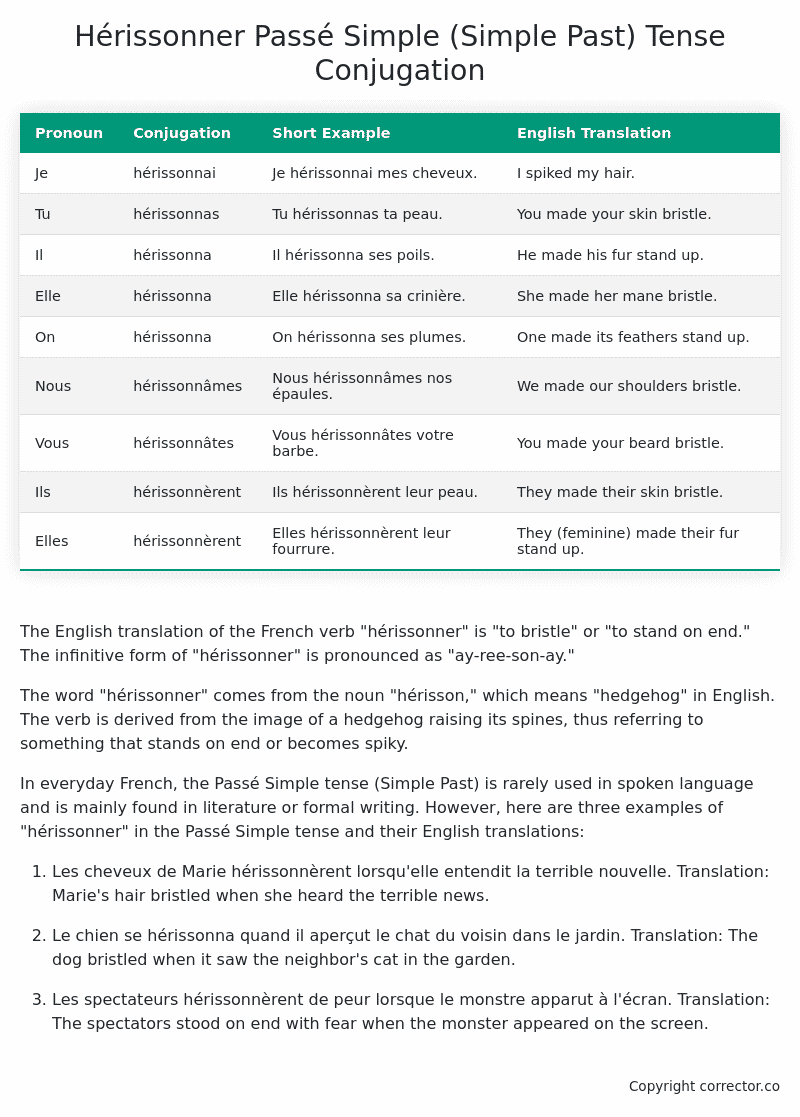Passé Simple (Simple Past) Tense Conjugation of the French Verb hérissonner
Introduction to the verb hérissonner
The English translation of the French verb “hérissonner” is “to bristle” or “to stand on end.” The infinitive form of “hérissonner” is pronounced as “ay-ree-son-ay.”
The word “hérissonner” comes from the noun “hérisson,” which means “hedgehog” in English. The verb is derived from the image of a hedgehog raising its spines, thus referring to something that stands on end or becomes spiky.
In everyday French, the Passé Simple tense (Simple Past) is rarely used in spoken language and is mainly found in literature or formal writing. However, here are three examples of “hérissonner” in the Passé Simple tense and their English translations:
-
Les cheveux de Marie hérissonnèrent lorsqu’elle entendit la terrible nouvelle.
Translation: Marie’s hair bristled when she heard the terrible news. -
Le chien se hérissonna quand il aperçut le chat du voisin dans le jardin.
Translation: The dog bristled when it saw the neighbor’s cat in the garden. -
Les spectateurs hérissonnèrent de peur lorsque le monstre apparut à l’écran.
Translation: The spectators stood on end with fear when the monster appeared on the screen.
Table of the Passé Simple (Simple Past) Tense Conjugation of hérissonner
| Pronoun | Conjugation | Short Example | English Translation |
|---|---|---|---|
| Je | hérissonnai | Je hérissonnai mes cheveux. | I spiked my hair. |
| Tu | hérissonnas | Tu hérissonnas ta peau. | You made your skin bristle. |
| Il | hérissonna | Il hérissonna ses poils. | He made his fur stand up. |
| Elle | hérissonna | Elle hérissonna sa crinière. | She made her mane bristle. |
| On | hérissonna | On hérissonna ses plumes. | One made its feathers stand up. |
| Nous | hérissonnâmes | Nous hérissonnâmes nos épaules. | We made our shoulders bristle. |
| Vous | hérissonnâtes | Vous hérissonnâtes votre barbe. | You made your beard bristle. |
| Ils | hérissonnèrent | Ils hérissonnèrent leur peau. | They made their skin bristle. |
| Elles | hérissonnèrent | Elles hérissonnèrent leur fourrure. | They (feminine) made their fur stand up. |
Other Conjugations for Hérissonner.
Le Present (Present Tense) Conjugation of the French Verb hérissonner
Imparfait (Imperfect) Tense Conjugation of the French Verb hérissonner
Passé Simple (Simple Past) Tense Conjugation of the French Verb hérissonner (You’re reading it right now!)
Passé Composé (Present Perfect) Tense Conjugation of the French Verb hérissonner
Futur Simple (Simple Future) Tense Conjugation of the French Verb hérissonner
Futur Proche (Near Future) Tense Conjugation of the French Verb hérissonner
Plus-que-parfait (Pluperfect) Tense Conjugation of the French Verb hérissonner
Passé Antérieur (Past Anterior) Tense Conjugation of the French Verb hérissonner
Futur Antérieur (Future Anterior) Tense Conjugation of the French Verb hérissonner
Subjonctif Présent (Subjunctive Present) Tense Conjugation of the French Verb hérissonner
Subjonctif Passé (Subjunctive Past) Tense Conjugation of the French Verb hérissonner
Subjonctif Imparfait (Subjunctive Imperfect) Tense Conjugation of the French Verb hérissonner
Conditionnel Présent (Conditional Present) Tense Conjugation of the French Verb hérissonner
Conditionnel Passé (Conditional Past) Tense Conjugation of the French Verb hérissonner
Conditionnel Passé II (Conditional Past II) Tense Conjugation of the French Verb hérissonner
L’impératif Présent (Imperative Present) Tense Conjugation of the French Verb hérissonner
L’impératif Passé (Imperative Past) Tense Conjugation of the French Verb hérissonner
L’infinitif Présent (Infinitive Present) Tense Conjugation of the French Verb hérissonner
L’infinitif Passé (Infinitive Past) Tense Conjugation of the French Verb hérissonner
Le Participe Présent (Present Participle) Tense Conjugation of the French Verb hérissonner
Le Participe Passé (Past Participle) Tense Conjugation of the French Verb hérissonner
Struggling with French verbs or the language in general? Why not use our free French Grammar Checker – no registration required!
Get a FREE Download Study Sheet of this Conjugation 🔥
Simply right click the image below, click “save image” and get your free reference for the hérissonner Passé Simple tense conjugation!

Hérissonner – About the French Passé Simple (Simple Past) Tense
Formation
Usage
Narration
Historical Context
Interactions with other tenses
Passé Composé
Imparfait
Conditional and Subjunctive
Summary
I hope you enjoyed this article on the verb hérissonner. Still in a learning mood? Check out another TOTALLY random French verb conjugation!


